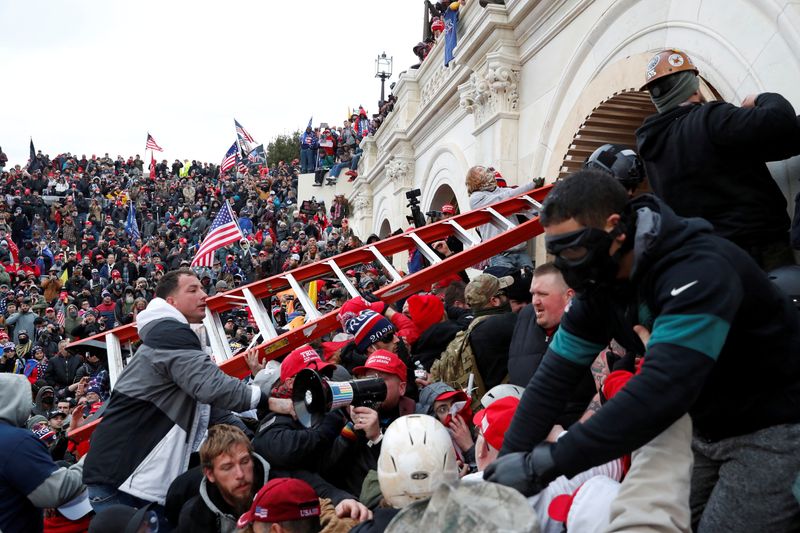By John Kruzel and Andrew Chung
WASHINGTON (Reuters) - Conservative U.S. Supreme Court justices on Tuesday signaled skepticism toward an obstruction charge brought by the Justice Department against a Pennsylvania man in the 2021 Capitol attack - a case with possible implications for the prosecution of Donald Trump for trying to overturn his 2020 election loss.
The justices heard arguments in Joseph Fischer's appeal of a lower court's ruling rejecting his attempt to escape a federal charge of corruptly obstructing an official proceeding - the congressional certification of President Joe Biden's victory over Trump that the rioters sought to prevent on Jan. 6, 2021.
Trump, the Republican candidate challenging the Democratic president in the Nov. 5 U.S. election, faces the same charge in a criminal case brought against him last year by Special Counsel Jack Smith.
The conservative justices, who form a 6-3 majority, expressed concerns about the decision by federal prosecutors to apply to Fischer's case an obstruction provision in the 2002 Sarbanes-Oxley Act, a law passed after the accounting fraud scandal at now-defunct energy company Enron. They grilled U.S. Solicitor General Elizabeth Prelogar about the law's sweep, how it should be interpreted and whether the charge was necessary given the range of other criminal counts brought against Jan. 6 defendants.
Conservative Justice Neil Gorsuch appeared wary that a broad reading of the law could encroach on non-violent protests, emphasizing the maximum penalty of 20 years in prison under the obstruction charge.
"Would a sit-in that disrupts a trial, or access to a federal courthouse, qualify?" Gorsuch asked Prelogar. "Would a heckler in today's (Supreme Court) audience qualify, or at the State of the Union address?"
Conservative Chief Justice John Roberts seemed inclined to view the law narrowly, suggesting it might apply only to defendants who alter or destroy evidence - an interpretation that Fischer has asked the court to embrace.
Fischer is accused of charging at police guarding a Capitol entrance during the attack. Fischer, at the time a member of the North Cornwall Township police in Pennsylvania, got inside and pressed up against an officer's riot shield as police attempted to clear rioters, according to prosecutors. He remained in the Capitol for four minutes before police pushed him out.
Jeffrey Green, a lawyer for Fischer, said prosecutors had misapplied the "Enron-driven evidence-tampering statute" to his client's case.
"Attempting to stop a vote count or something like that is a very different act than actually changing a document or altering a document," Green told the justices.
Liberal Justices Sonia Sotomayor and Elena Kagan challenged Green's narrow view of the law, suggesting that lawmakers had aimed to craft an expansive statute.
"They wanted to cover every base," Sotomayor told Green.
'INTIMIDATE CONGRESS'
Conservative Justice Brett Kavanaugh asked Prelogar why the other charges filed against Fischer, including assault and disorderly and disruptive conduct, were not "good enough" for prosecutors.
Other charges do not fully capture the fact that Fischer "wanted to intimidate Congress," Prelogar responded.
Prelogar pointed to a text message that Fischer sent, according to prosecutors, prior to the Capitol assault in which he said of Democratic lawmakers: "Can't vote if they can't breathe..lol."
"He went to the Capitol on January 6th with that intent in mind and took action," Prelogar said, adding that Fischer's conduct had impeded the ability of law enforcement officers "to regain control of the Capitol and let Congress finish its work in that session."
Jan. 6 defendants convicted of obstruction have received far lesser sentences than the 20-year maximum.
About 350 of the roughly 1,400 people charged in the Capitol attack have been charged with obstruction. A Supreme Court ruling dismissing the charge against Fischer would likely prompt them to seek re-sentencing, withdraw their guilty pleas or request new trials, though many would face additional hurdles.
Such a ruling also could make it more complicated - but not impossible - to make Trump's obstruction-related charges stick, according to experts.
In August 2023, Smith brought four federal criminal counts against Trump: conspiring to defraud the United States, corruptly obstructing an official proceeding and conspiring to do so, and conspiring against the right of Americans to vote. The Supreme Court will hear arguments on April 25 in Trump's assertion of presidential immunity from prosecution in the case.
Smith has separately charged Trump in a case involving the retention of classified documents after leaving office.
Fischer is awaiting trial on six other criminal counts, including assaulting or impeding officers and civil disorder, while he challenges his obstruction charge.

U.S. District Judge Carl Nichols, a Trump appointee, dismissed Fischer's obstruction charge, ruling it applies only to defendants who tampered with evidence. The U.S. Court of Appeals for the District of Columbia Circuit reversed that decision, prompting Fischer's appeal.
The Supreme Court's ruling is expected by the end of June.